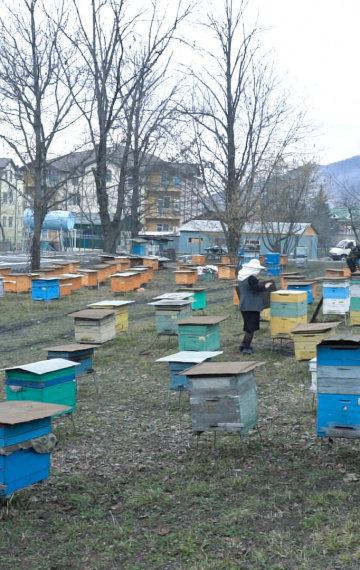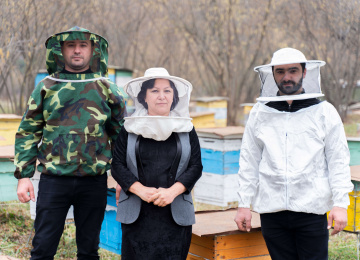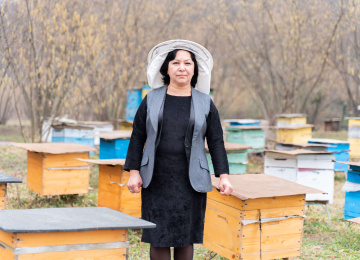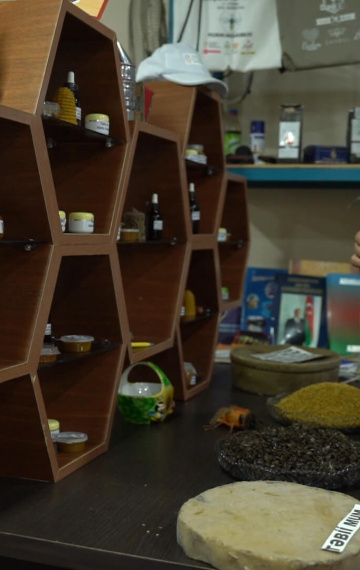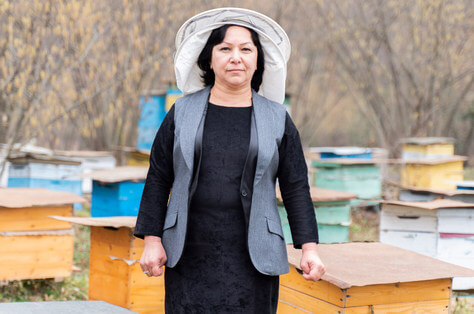
Lala Gurbanaliyeva lives with her husband in Yukhari Tala, a village in Zagatala, a mountainous region of Azerbaijan. They have two sons, 30 and 32, both of whom have their own families. By education, Lala is a construction engineer. However, it was difficult to find decent work in this sphere, so she became a math teacher in the local high school instead.
Gurbanaliyeva’s husband is a renowned beekeeper. In order to increase the family’s income, Lala began helping her husband with beekeeping. Her sons and their spouses also started to contribute to the family beekeeping business in a variety of ways. One of the boys specializes in making and repairing beehives, the other one helps with selling honey. In time, the Gurbanaliyevs managed to increase their bee colonies to 400.
Lala heard about the EU-funded “Accelerating development of sustainable micro-entrepreneurship in rural regions of Azerbaijan” (ADSMIRRA) Project being implemented by Azerbaijan Micro-finance Association (AMFA) from Turan Bank and discussed this opportunity with her husband. They thought that it could be a great opportunity for her and her sons to start up their own beekeeping business and all three decided to apply. “We were invited to attend workshops in financial literacy, business planning and cooperative development organized by AMFA with EU support,” recalls Lala Gurbanaliyeva. “Later, we were offered additional support from the Project: we had qualified for grants. It was great news for our whole family and we felt so lucky!”
Once the family received the funding, they set up a family cooperative. Beekeeping requires all the family to work together: it is not a job for one person. Most of the grants they invested in purchasing honey extraction equipment. They also bought about 60 new bee colonies for the sons, 30 for each, and some protective clothes and other necessary items. Now the family has altogether about 460 bee colonies that produce honey. This allows them to produce enough honey to satisfy customer orders, thanks to the efficiency ensured by the honey extraction equipment. The Gurbanaliyevs are able to respond to market demand on time with great quality.
Lala is also actively expanding her own apitherapy business as a part of the family cooperative and this enthusiasm has an interesting history. Initially, she was just an assistant to her husband, but at one point she became ill with some persistent illness that she couldn’t get rid of for quite some time. After suffering for several months, she discovered she could cure herself by taking propolis. “Since then, I have become passionate about the healing power of honey products,” admits Gurbanaliyeva, and says she is keen to help more people with apitherapy.
After receiving her grant, Lala Gurbanaliyeva not only continued to take care of bees but also began preparing bee products such as propolis, bee’s wax, royal jelly, bee pollen and more. She now also prepares natural cosmetics for skin care from honey and other bee products. Lala says many people call her for advice, which she provides wholeheartedly. She is full of ideas about the future of her apitherapy.
The current pandemic has had its negative impact on the family cooperative as well: with roads closed, they had difficulty moving bees to the fields where the insects used to start collecting honey. It is also challenging to sell honey and honey products because the number of foreign tourists and local people who used to visit their district has declined drastically.
But the Gurbanaliyevs remain optimistic and they have learned to applied new ways to re-establish client connections and manage logistics. Having set up social media accounts, the family has been able to promote and sell their honey products online, too. The e-sergi.az platform, which has been developed and launched by the Project, is another support tool to help them in this direction.
Lala’s family is determined to develop their family cooperative and expand their market share and product diversity. “We are much grateful for the EU support and believe it has opened a new page in our lives,” confesses Lala.
AMFA has been implementing the European Union-funded “Accelerating Development of Sustainable Micro-entrepreneurship in Rural Regions of Azerbaijan” (ADSMIRRA) Project in the economic regions of Ganja-Gazakh, Guba-Khachmaz, Shaki-Zagatala and Aran over 2018-2021. The Project aim has been strengthening the potential of micro and small entrepreneurs in rural areas by providing workshops in financial literacy, business planning, running cooperatives, mentoring, allocating capital for starting or expanding micro businesses, and more. Altogether, the Project has supported the launch of 37 start-ups, the expansion of 76 micro businesses and the generation of 125 jobs in rural Azerbaijan, allowing 202 families to increase their monthly income and 3 cooperatives to be established.

